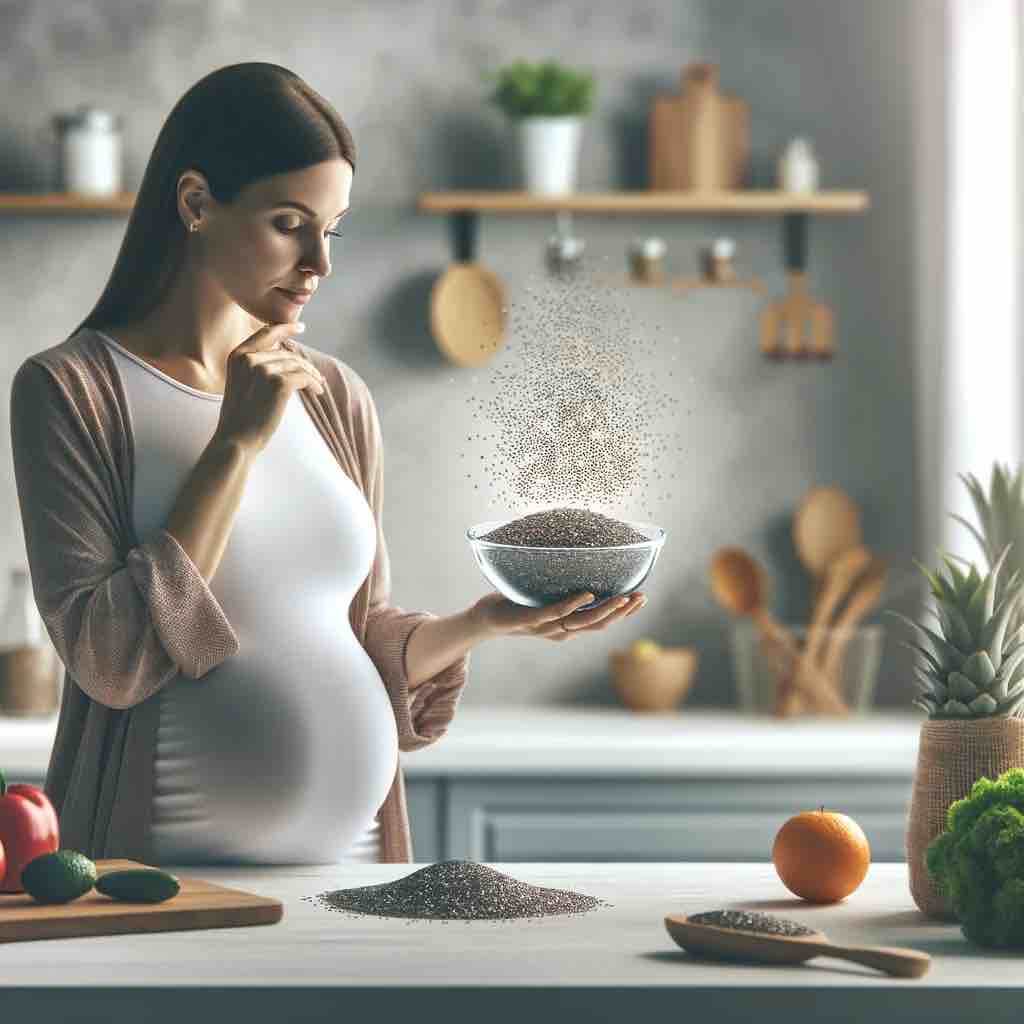
Pregnancy is a time when every morsel of food counts towards the health and well-being of both the mother and the growing baby. One food item that often sparks curiosity among expecting mothers is chia seeds. Known for their nutritional value, chia seeds are considered a superfood. But are they safe to consume during pregnancy? Let’s delve into a detailed exploration of chia seeds in the context of pregnancy.
Understanding Chia Seeds
Chia seeds are tiny black seeds from the plant Salvia hispanica, native to Central America. They are renowned for their impressive nutrient profile – rich in omega-3 fatty acids, fiber, protein, antioxidants, and essential minerals like calcium, magnesium, and iron.
Nutritional Benefits of Chia Seeds for Pregnant Women
Omega-3 Fatty Acids for Fetal Development
Omega-3 fatty acids are crucial for the brain development of the fetus. Chia seeds are a plant-based source of these fatty acids, making them an excellent option for vegetarians and vegans.
High Fiber for Digestive Health
The high fiber content in chia seeds can help regulate bowel movements, a common concern during pregnancy. Adequate fiber intake can alleviate constipation, a frequent issue among pregnant women.
Protein for Growth
Protein is vital for the growth and development of the baby, and chia seeds are a good source of this essential nutrient.
Calcium, Magnesium, and Iron
These minerals play a crucial role in the development of the baby’s bones and overall health. Chia seeds can contribute to the necessary intake of these minerals.
Are Chia Seeds Safe During Pregnancy?
Generally, chia seeds are considered safe for consumption during pregnancy. However, it’s important to keep a few things in mind:
Moderation is Key
Like any food, chia seeds should be consumed in moderation. They are high in fiber, which can cause bloating or gas if overconsumed.
Potential Risks
While rare, some people may have allergies to chia seeds. It’s important to be aware of any allergic reactions.
Hydration
Chia seeds absorb water and expand. It’s crucial to stay well-hydrated when consuming them to avoid gastrointestinal discomfort.
Quality and Preparation
Ensure that the chia seeds are of good quality and properly cleaned. They can be consumed raw or added to foods like yogurt, smoothies, and salads.
Incorporating Chia Seeds into a Pregnancy Diet
Here are some ideas for including chia seeds in your diet:
- Chia Pudding: Soak chia seeds in milk or a dairy-free alternative overnight, add fruits and nuts for a nutritious breakfast.
- Smoothies: Blend chia seeds with fruits, vegetables, and milk for a quick and healthy snack.
- Yogurt Parfait: Layer yogurt with chia seeds, fruits, and granola for a delicious treat.
- Baking: Add chia seeds to muffins, bread, or pancakes for an extra nutrient boost.
Consultation with Healthcare Providers
Before making significant dietary changes or if you have any concerns about consuming chia seeds during pregnancy, it’s advisable to consult with a healthcare provider. They can offer personalized advice based on your individual health needs.
Conclusion
Chia seeds can be a nutritious and safe addition to a pregnancy diet, offering a range of essential nutrients beneficial for both the mother and the baby. However, like with all foods during pregnancy, they should be consumed in moderation and as part of a balanced diet. Always stay hydrated and be mindful of any potential allergic reactions. With these considerations in mind, chia seeds can be an excellent way to enhance the nutritional value of your pregnancy diet.
10 FAQs About Eating Chia Seeds During Pregnancy
- Can chia seeds benefit my baby’s development? Yes, chia seeds are rich in omega-3 fatty acids, crucial for fetal brain and eye development.
- How much chia seeds should I consume daily during pregnancy? It’s recommended to have about 1-2 tablespoons of chia seeds daily. However, consult your healthcare provider for personalized advice.
- Are chia seeds a good source of protein for vegetarians during pregnancy? Yes, they are an excellent plant-based protein source, making them ideal for vegetarians and vegans.
- Can chia seeds help with pregnancy constipation? Yes, the high fiber content in chia seeds can aid in alleviating constipation, a common issue during pregnancy.
- How do I include chia seeds in my pregnancy diet? Chia seeds can be added to smoothies, yogurts, oatmeal, or used in baking recipes.
- Are there any side effects of consuming chia seeds during pregnancy? Consuming chia seeds in moderation is generally safe. Overconsumption may lead to bloating or gas due to their high fiber content.
- Can chia seeds prevent gestational diabetes? While chia seeds can be part of a healthy diet, there’s no conclusive evidence they can prevent gestational diabetes. Consult a healthcare provider for advice on managing gestational diabetes.
- Do chia seeds need to be cooked before eating? No, chia seeds can be eaten raw or soaked in liquids like milk or water.
- Can chia seeds cause allergies? Chia seed allergies are rare but possible. If you experience any allergic reactions, stop consumption immediately and consult a doctor.
- Is it safe to eat chia seeds in the first trimester? Yes, chia seeds can be safely consumed during the first trimester as part of a balanced diet.
Blog Tags for the Post
chia seeds, pregnancy nutrition, omega-3 fatty acids, fiber-rich foods, plant-based proteins, healthy pregnancy diet, natural remedies, gestational health, maternal health, dietary supplements








